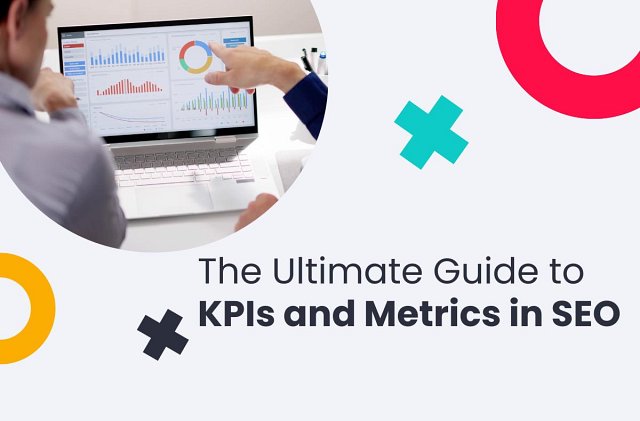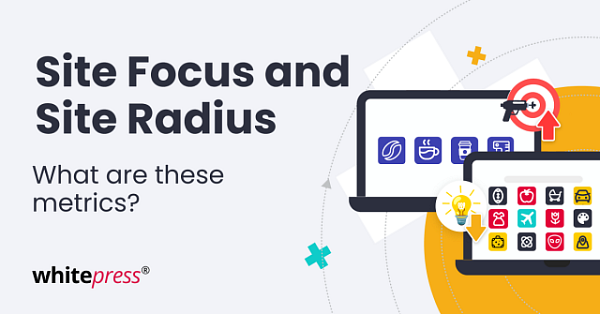(13 min. read)

What Are SEO KPIs?
The Key Performance Indicators for SEO are quantifiable measures used to evaluate and assess the success of an SEO strategy in meeting its goals. These indicators are, as the name might suggest, key for monitoring the performance of various SEO activities and making informed decisions to enhance a website’s search engine ranking and visibility. KPIs are specifically selected based on their direct impact on the project’s objectives.
SEO KPIs (Key Performance Indicators) and standard metrics both provide valuable insights into website performance, but they differ in several ways. For example, SEO KPIs are directly aligned with strategic business objectives, such as increasing sales or generating new leads. They are selected based on their ability to impact these goals directly. Standard metrics, on the other hand, may provide general insights into website performance but do not necessarily tie back to specific business objectives.
These KPIs can also highlight areas of success and areas needing improvement, allowing businesses to allocate resources effectively. Standard metrics may provide data points without clear implications for action or strategy, including a broader range of website performance indicators, like non-SEO-related factors like social media engagement or email sign-ups.
The Importance of Tracking the Right SEO KPIs
SEO KPIs play a pivotal role in both strategizing and optimizing websites. They provide a focused framework for SEO professionals to:
- Identify successful tactics: By tracking the right KPIs, SEO teams can see which tactics yield the best results, allowing them to allocate resources such as time, money, and manpower more effectively and replicate successful strategies.
- Spot areas for improvement: KPIs can highlight underperforming areas or emerging opportunities, guiding SEO practitioners in refining their approach.
- Communicate results: KPIs offer a clear, quantifiable way to report success to stakeholders, demonstrating how SEO contributes to the business's bottom line.
You can utilize a data-driven approach anchored around KPIs personalized to your business to more effectively tailor your SEO strategies to meet specific goals. This way, you’ll be improving your online presence and search engine visibility, but also aligning your website’s performance more closely with the business’s broader objectives.
How to Define the Right SEO Performance Indicators
The KPIs you choose should not only reflect your specific business objectives, but they should also empower your team to track progress accurately and make informed SEO decisions. The first step in defining the right SEO KPIs is to ensure they are in direct alignment with your business goals. Different types of businesses will have varying priorities, such as increasing sales, generating leads, boosting brand awareness, etc.
E-commerce sites might focus on KPIs like organic session conversion rate, average order value from organic traffic, or specific product page rankings. Service-based businesses could prioritize local search visibility, organic leads generated (e.g., form submissions, sign-ups, etc.), or calls initiated from organic searches. Content publishers may look at organic traffic growth, time on site, as well as pages per session to measure engagement and content effectiveness.
Secondly, choose KPIs that provide insights into your specific objectives. Utilize tools like Google Analytics, Google Search Console, SEMrush, or Ahrefs to track your chosen KPIs. Make sure you have proper tracking in place for all conversions and interactions relevant to your goals.
Next, define the targets for each of your KPIs. Set specific, measurable targets to provide clear markers for success and accountability. These targets should be realistic, based on historical data and industry benchmarks, and aligned with your overall business goals.
Ongoing Monitoring and Analysis
Setting up your trackers is not yet the end of the process - the next step is to develop regular reporting schedules (weekly, monthly, quarterly) to review KPIs. Include context in your reports to help understand fluctuations in the data. Make sure everyone involved understands what each KPI means and why it is important. This shared understanding is crucial for effectively using the data to make decisions.
Use the data from your KPIs to refine your SEO tactics. For example, if certain pages are underperforming in organic search results, consider revising the content or improving on-page SEO elements like meta tags and headings. Regularly test new strategies and compare their performance against your KPIs. This could include A/
As business goals shift or industry dynamics change, be prepared to reassess and adjust your KPIs. This adaptability ensures your SEO strategy remains relevant and aligned with your business objectives.
Key SEO KPIs to Track
To effectively measure and optimize your SEO efforts, it's crucial to track a range of KPIs that reflect various aspects of your strategy. Each of the following KPIs provides valuable insights into different dimensions of SEO performance:
Organic Traffic
Organic Traffic refers to the number of visitors who arrive at your website from unpaid search engine results. It is a fundamental KPI for SEO, as it directly reflects the visibility and effectiveness of your site in search engine rankings. Tracking organic traffic helps assess the health of your SEO efforts and is often seen as a primary indicator of success.
Organic Visibility
Organic Visibility measures how often your website appears in search results for keywords relevant to your business. This KPI is crucial for understanding the reach of your SEO activities across different search queries. An increase in organic visibility suggests improvements in keyword rankings and optimization strategies. Use the Google Search Console to access data reports on total clicks, impressions, your CTR, and the average position of your website for specific keywords.
Tools like SEMrush and Ahrefs also provide a "visibility score", which calculates how visible your site is based on the volume of searches for the keywords it ranks for and the positions of those rankings. This score helps gauge overall visibility across multiple keywords and competitors.
Branded vs. Non-Branded Traffic
Branded vs. Non-Branded Traffic distinguishes between visitors who searched for your brand name (branded) and those who found your site through other search queries (non-branded). Monitoring this can help you understand the strength of your brand in organic search and the effectiveness of your SEO tactics in attracting traffic through non-branded, often more competitive, keywords.
Organic Traffic Conversions
Organic Traffic Conversions track how many visitors from organic search complete a desired action, such as making a purchase, signing up for a newsletter, or filling out a contact form. This KPI helps evaluate the real business value generated from your SEO efforts, highlighting the quality of traffic and effectiveness of your site in encouraging conversions.
First, set up proper tracking in your analytics platform, like Google Analytics, to segment and monitor organic search traffic. Define what a "conversion" entails (e.g., a completed sale), and calculate the conversion rate using the formula: (Number of Sales from Organic Traffic /
Keyword Rankings
Keyword Rankings measure the positions of your website's pages in search engine results pages (SERPs) for specific keywords. This KPI is essential for tracking the success of your keyword strategy and understanding which keywords drive the most valuable traffic to your site.
Click-Through Rate (CTR)
Click-Through Rate (CTR) indicates the percentage of users who click (Total clicks) on your website's listing in the search results versus how many times it was shown (Total impressions). High CTRs generally suggest that your meta titles and descriptions are effective and appealing to your target audience, driving more organic traffic to your site.
Number and Quality of Backlinks
Number and Quality of Backlinks reflects both the quantity and the credibility of external sites linking to your website. High-quality backlinks from reputable sites are a strong signal to search engines of your site's authority and relevance, significantly affecting rankings.
It's essential to focus on acquiring backlinks from relevant, trustworthy sources within your industry or niche. When evaluating the quality of backlinks, consider factors such as the linking site's domain authority, topic relevance, traffic levels, and the context in which the link is placed. Backlinks from authoritative, topically relevant sites with high traffic and contextual relevance tend to carry more weight in search engine algorithms.
Leverage link analysis tools to gain deeper insights into your backlink profile. Platforms like Ahrefs, Moz, and SEMrush can help you assess link quality, identify toxic backlinks, and monitor competitor link-building activities. By tracking changes in backlink quantity and quality over time, you can gauge the effectiveness of your link-building efforts and make data-driven adjustments to your SEO strategy.
Domain Authority
Domain Authority is a score (typically from 0 to 100) developed by SEO software companies like Moz to predict how likely a website is to rank in search engine result pages. It helps compare the competitive strength of your site to others and assesses the impact of your link-building strategies.
The Domain Authority score is calculated by evaluating various factors, including the site's age, backlink profile (quantity and quality of inbound links), and on-page optimization. A higher Domain Authority score generally indicates a stronger website with a higher likelihood of ranking well. However, it's important to note that Domain Authority is a proprietary metric and not an official ranking factor used by search engines like Google.
Bounce Rate
Bounce Rate measures the percentage of visitors who leave your site after viewing only one page, without further interacting with the site content. This metric can indicate how well your site meets the expectations of users and whether the content is relevant to their search queries.
Page Load Time
Page Load Time tracks how quickly pages on your site load for users. Faster load times improve user experience and can contribute to higher SEO rankings as search engines prioritize speed. Page load time is especially crucial for mobile users, as slower load times can lead to higher bounce rates and negatively impact conversions.
To optimize page load time, consider techniques such as image compression, browser caching, minimizing HTTP requests, and leveraging content delivery networks (CDNs). Tools like Google PageSpeed Insights and WebPageTest can provide insights into specific areas for improvement and suggest optimizations.
Average Engagement Time
Average Engagement Time measures how long visitors interact with your content on average. This metric helps gauge content quality and relevance, which are critical for keeping users engaged and influencing search rankings.
Session Duration
Session Duration assesses the average length of time a user spends on your site during a single session. Longer sessions can indicate more engaging and relevant content, which positively impacts SEO performance.
SEO ROI
SEO ROI calculates the return on investment for your SEO activities. This KPI helps quantify the financial value that SEO brings to your business, making it easier to justify SEO efforts and budget allocations. It encompasses direct costs like hiring SEO specialists, subscribing to SEO tools, content creation expenses and any indirect costs such as the time spent by your team implementing SEO strategies.
The formula for calculating SEO ROI is: (SEO Revenue - SEO Investment) /
Social Signals
Social Signals refer to webpage activities like shares, likes, and comments on social media platforms. While not a direct ranking factor, these can indicate content popularity and relevance, which indirectly influence SEO performance.
Cost Per Acquisition
Cost Per Acquisition in the context of SEO, measures the cost associated with acquiring a new customer through organic search traffic. It is crucial for evaluating the efficiency and effectiveness of your SEO strategy, particularly in comparison to other marketing channels.
Advanced SEO Metrics and KPIs
Beyond the fundamental KPIs, there are more nuanced metrics that can offer deeper insights into your SEO performance. These advanced metrics will help you understand the intricacies of SEO tactics that affect your site’s overall health and success in search rankings.
Google Business Profile Metrics
Google Business Profile, formerly known as Google My Business, is essential for local SEO and helps businesses manage their online presence across Google, including Search and Maps. Tracking GBP metrics can provide valuable insights into how your business is perceived and interacted with by local consumers. Key GBP metrics to monitor include:
- Search Queries: The terms and phrases that users are searching for when your profile appears. This metric helps you understand what potential customers are looking for and how well your profile matches these queries.
- Customer Actions: Tracks what actions customers take when they view your profile, such as visiting your website, clicking on directions, or calling your business. This metric is crucial for assessing the engagement and conversion effectiveness of your GBP.
- Views: The number of times your profile has been viewed through Google Search and Google Maps. Views can be segmented into direct searches (searching directly for your business name or address) and discovery searches (searching for a category, product, or service that your business offers).
- Photo Views and Quantity: Compares the performance of your photos in terms of views versus those of similar businesses. This can indicate the attractiveness and relevance of your visual content.
Monitoring these metrics allows you to optimize your GBP for maximum visibility and engagement, crucial for businesses relying on local traffic.
SEO Optimized Site Architecture and Internal Links
The architecture of a website and the strategy behind its internal linking are pivotal for both user experience and SEO. A well-structured site with strategically placed internal links can significantly improve site crawlability and indexing, as well as distribute page authority throughout your site. Advanced metrics to track in this area include:
- Click Depth: Measures how many clicks it takes to reach a page from the home page. Pages that require fewer clicks are generally considered more important, both to users and search engines.
- Internal Link Distribution: Analyses the quantity and quality of internal links pointing to a page. This metric helps ensure that important pages receive adequate link equity and are easier for users and search engines to find.
- Page Crawl Frequency: Tracks how often search engines crawl each page. Frequent crawling can be a sign that a page is considered important and is kept up-to-date in the search index.
- Orphan Pages: Identifies pages with no internal links pointing to them. These pages are often missed by search engines and users, which can lead to missed SEO opportunities.
Optimizing these aspects of your website can lead to better indexing and higher rankings in search engines. By understanding and improving these advanced metrics, you can adapt your SEO strategy to enhance overall site performance and user engagement.
Conclusion: The Critical Role of SEO KPIs in Achieving Online Success
SEO KPIs are not just numbers; they are insights that guide strategic decisions and drive tangible improvements in online visibility and engagement. By carefully selecting KPIs that align with specific business goals, companies can focus their efforts on what truly matters, ensuring that their SEO activities contribute to overall business success.
It’s crucial to understand the difference between general metrics, which provide broad insights into website performance, and KPIs, which are directly linked to achieving strategic business objectives. This distinction helps prioritize actions and allocate resources more effectively.
Successfully integrating SEO KPI tracking into regular workflows is essential for continuous improvement. Regular monitoring and analysis allow for quick adaptations and optimizations, ensuring that SEO strategies remain effective even as market conditions change.



